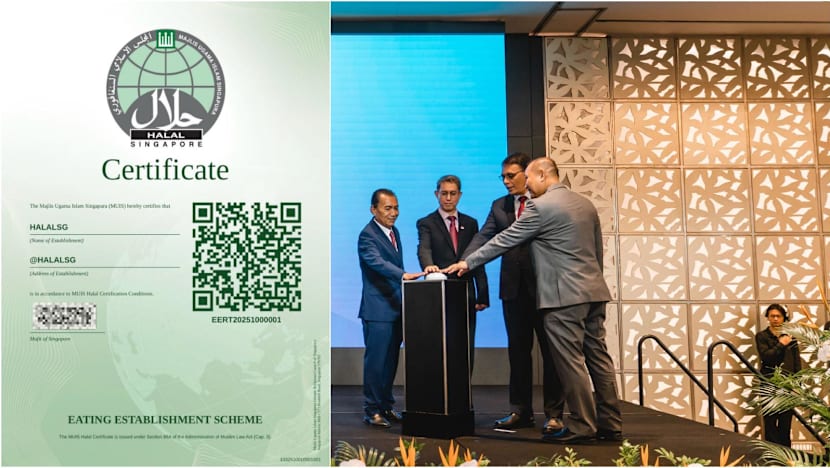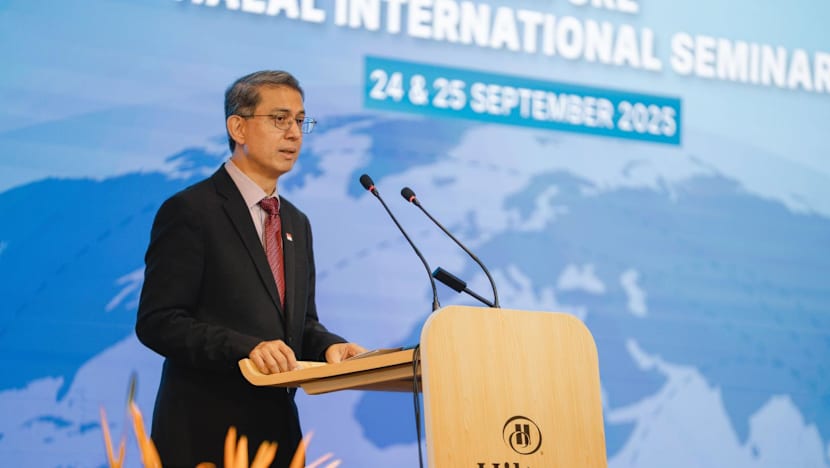New digital halal certificates with QR codes to roll out in Singapore from Oct 1
The establishment's certification details, validity status and certification type will be accessible through scanning a QR code on the certificate, said MUIS.

MUIS will introduce digital halal certificates and an enhanced framework for recognising foreign halal certification bodies from Oct 1, 2025. Acting Minister-in-charge for Muslim Affairs Muhammad Faishal Ibrahim (second from left) launched the enhanced framework together with MUIS executives at Hilton Singapore Orchard on Sep 24, 2025. (Photos: MUIS)

This audio is generated by an AI tool.
SINGAPORE: Instead of writing in to the authorities to check on a shop's halal certification, consumers will be able to view updated information by scanning the new QR codes to be featured on these certificates from Oct 1.
The establishment's certification details, validity status and certification type will be accessible through scanning the code, the Islamic Religious Council of Singapore (MUIS) announced on Wednesday (Sep 24) at the Singapore Halal International Seminar.
The digital certificates will be issued to establishments such as restaurants, cafes, caterers, central kitchens, manufacturing plants and poultry abattoirs.
This marks a step forward in transparency, integrity and accessibility for Singapore's halal certification system, MUIS said in a press release, adding that the move is part of its digitalisation efforts to streamline administrative processes and enhance operational efficiency.
Businesses can still use the old certificates until March 2026, when all establishments must switch to the new certificates.
On top of the halal certification, MUIS said that foreign halal certification bodies can also kickstart the application process to be recognised in Singapore through an online portal from Oct 1.
These bodies are organisations that implement halal standards in their home countries, and examples include the American Halal Foundation and Australian Halal Food Services. At the moment, they submit their completed application through email correspondence with MUIS.
Under an enhanced framework, the processing time is expected to be shortened from at least six months now to a maximum of three months in future. Organisations can track the status of their applications online as well.
These foreign certification bodies will be subject to a S$1,000 (US$780) application fee, S$2,000 recognition fee and S$120 assessment fee.
If applicable, the organisations must also pay a S$700 audit fee per man day, which refers to the amount of work one person does in one day.
All foreign halal certification bodies must apply for recognition under the new framework and those who are currently recognised will be given a temporary extension until January 2026, said MUIS.
The foreign organisations that are recognised by MUIS are presently listed on its website so that businesses in Singapore know they can import food from companies that have certificates from these organisations, said the council. Presently, 101 organisations are recognised by MUIS.
MUIS said the enhanced framework will provide greater transparency on qualifying criteria and implement robust assessment and evaluation.
The two initiatives aim to strengthen MUIS’ governance over Singapore’s halal ecosystem, increase consumer confidence and trust in halal products, and support the halal industry’s growth in an increasingly interconnected global economy.

At the seminar, Acting Minister-in-charge of Muslim Affairs Faishal Ibrahim said there is a need to evolve with the changing global landscape and embrace digital tools.
The digital halal certificates enhance certification integrity and accessibility, while the changes for foreign halal certification bodies streamline work processes and give local consumers greater confidence in the products imported to Singapore.
"As a small nation with limited land and resources, Singapore imports most of our food. For our Muslim community, who make up about 15 per cent of our population, this also means that we will need a steady supply of halal food imports," he said.
That makes halal certification critical to food security, he added.
"Beyond ensuring that our food products meet the religious requirements, it is about building up our network of partners to ensure that our people have reliable access to food they can trust."















